- Home
- J. Robert Kennedy
Embassy of the Empire Page 3
Embassy of the Empire Read online
Page 3
Acton smiled slightly at the phone. “Thanks, Greg. That should help put all of our minds at ease a little.”
“So, then you are concerned.”
Acton tossed his head back, groaning. “I was only saying that to be nice!”
Greg laughed. “I know, and I was only saying that to get a rise out of you. Just keep me updated regularly, okay?”
Acton laughed. “Okay, Dad, I promise.”
“Hey, just because half my head is gray, it doesn’t mean I’m old enough to be your father.”
Acton leaned over the phone. “Goodbye, Daddy.” He tapped the screen to end the call.
Laura looked up from her tablet. “He is a worrywart, isn’t he?”
“He is that, and he’s become worse since Peru. I guess I can’t blame him. I wasn’t the only one to lose students that day.”
“Are you concerned?”
Acton glanced at her. “Not at all. It’s China. We’ve been there before.”
“Yeah, and look what happened.”
Acton laughed. “Yeah. Actually, I almost forgot about that. We’ve been through so much crap over the past few years, it’s hard to keep track where we’ve been shot at.”
“How can you forget a Chinese coup that we were caught in the middle of?”
He shrugged. “Just an average day for us.”
It was her turn to laugh. “I don’t know whether I should be more concerned that I’m laughing at that, or that it’s true. Obviously, with it being China, we’ll have to be careful and be on our best behavior, but I doubt we have to really worry about anything. Let’s just stick to the dig site and our hotel, and never go out alone.”
He reached out and took her hand. “Do you honestly think I’d ever let you out of my sight for a minute?”
She gave him the stink eye. “I can take care of myself, thank you very much.”
He grinned. “I wasn’t talking about that.”
She gave him a seductive look. “Just what do you have on your mind, Mister?”
“Nothing they’ll be playing on Disney Plus.” He dove at her and she squealed.
7 |
Luoyang, Han Empire 166 AD
Lucius had never been more terrified or excited in his entire life, and that life included numerous battles for the Empire and a voyage that would have curdled the blood of Hercules himself. He had quickly determined that the map showed his current location and then a destination. He had doused his lamps then exited the room through his window, the drop to the ground not very far, and hopefully it wouldn’t prove a challenge when he returned.
He had kept to the shadows, few out at this hour beyond guards, the capital city heavily patrolled. But with each step, he realized his ultimate destination was the Imperial Palace, and the very notion terrified him. If he were caught alone at this hour in the streets, he might be forgiven for merely being curious, but on the grounds of the palace itself, it might mean immediate death for them all.
This entire endeavor was foolish. He had no idea who the woman was who had delivered him the map, and no idea what was at the end of it beyond the red X marking his destination. Was it something he was supposed to see? Take? Or was it some person he was supposed to meet? And was it an innocent meeting, or was it a trap? Perhaps death awaited him when he reached this red X, or perhaps he would be kidnapped and held as a bargaining chip against his father, against the Roman Empire itself.
Whatever it was, he had no doubt no good could come of it, yet he was compelled to continue forward. Perhaps it was the impetuousness of youth, or perhaps it was his faint, irrational hope that at the end of this map was something that would have made worthwhile this entire infernal journey foisted upon him by his father in a bid to make him a man. He had been forced to leave the only home he had ever known, along with all of his family and friends, only to make his home here, years away from civilization. He had never wanted this, and he needed a reason, a purpose, that would give it all meaning.
He was about to step out from between two buildings when he heard voices. He fell back, pressing against the wall, and forced himself to steady his breathing as four guards walked by, marching swiftly as had most of the other patrols he had encountered. It was clear to him these men weren’t searching for anything. They were merely a deterrent. The pace at which they marched and the noise they made precluded them from detecting any ne’er-do-wells, and from what he had seen, he was the only one in the city worth apprehending.
The guard passed and he cocked an ear, hearing no one else. He darted across the street, the Imperial Palace ahead, though the map thankfully didn’t lead him to the main gate. He continued in the shadows along the front wall, then rounded the corner, left of the gate. The line tracing the route he should follow ended halfway along the wall, then continued on the other side. He spotted a reinforced door, and though no guards were evident, an untold number could lie on the other side.
He pressed an ear against the wood but heard nothing. He tried the handle to find it locked. He pushed against the door to no avail, then looked around, pondering what to do next.
The lock clicked.
His heart skipped several beats as he reached for his sword. He stopped. If he were to engage in battle, it would mean the death of the entire ambassadorial mission. He could still plead ignorance. He could still claim he had gone out to explore the city and gotten lost, and the only landmark he had recognized was the palace where he thought he might find help. The door opened and every muscle in his body tensed.
Then he sighed in relief at who stood there to greet him.
It was the woman who had delivered the map.
She beckoned him inside, and with furtive glances over both shoulders, he entered. She closed the door then locked it. He was now inside the Imperial Palace, alone with a woman whom he had no idea of her status or motives. He was a foreigner in a foreign land, who had no right or reason for being where he was, and if caught, all the blood spilled would be on his hands. He could still leave, he could still turn around and compel her to unlock the door, yet her demeanor suggested there was nothing to fear here. She was smiling at him, beckoning him to follow her, and he found he couldn’t resist her urgings.
Yet it was clear she, too, didn’t want them caught. She stuck to the shadows, listening for what he assumed were patrols, but moments later they were inside a building, and the instant she closed the door, she visibly relaxed. Her smile broadened in the torch-lit hallway, and he was led, this time at a casual pace, toward a room at the far end. She knocked and a woman replied, saying something in their native tongue. She opened the door and stepped aside, tilting her head, indicating he should enter. He hesitated and she urged him again, her smile widening.
He stepped through the door, his hand on the hilt of his sword, still uncertain as to what he might be about to face. But when he stepped inside, his wildest imaginings couldn’t have prepared him for what he saw.
It was Princess Jieyou, standing by the fire, her head bowed.
He immediately took a knee as his father would have wanted him to, but was uncertain as to what to say, for he spoke none of her language.
“You may rise.”
8 |
Roman Embassy Dig Site Luoyang, China Present Day
Professor Cao Zhengsheng stood at the edge of the pit, staring down at the excavation below, imagining what had stood here almost 2000 years ago. One of his students had begun conceptual drawings and, while mostly guesswork, they were impressive even in their most modest configurations. It was a testament to Roman design, intentionally meant to remind anyone who would see it that this was a piece of Rome in their midst. As far as they could tell, it had been surrounded by traditional Chinese structures, though with those mostly built of wood at the time, there was little left of them beyond the outline of their foundations. This structure, however, had been constructed from stone, meant to last for centuries if not longer, though all evidence so far suggested the building had been intentionally knocked
down and buried shortly after its construction.
Most historians familiar with the period were aware of the reports of the first official Roman delegation sent to the Han Empire, and the dynasty’s own records showed they had arrived in 166 AD by the Gregorian Calendar, yet there were few details beyond that. There were no reports of any treaties, of any return trips, of any reciprocal exchanges. There were other delegations and other attempts at formal relations a century later, yet this particular expedition had almost been forgotten by history beyond a few brief mentions.
What had been discovered only months ago, was the first physical proof of a significant Roman presence in the capital city of the Han Empire, one of the most powerful empires in the region at the time. This wasn’t just a delegation that had come here to discuss a possible treaty then leave. One didn’t build a significant structure such as this if that were the intention. These Romans had meant to stay, and to stay permanently. Yet after all the effort of constructing the building, it had been knocked down, the Roman presence for some reason erased from the Far East.
He checked his watch, an old friend of his, James Acton, and his wife whom he had never met though knew by reputation, Laura Palmer, were due to arrive shortly. He was eager to see them and discuss what his team had so far discovered. There was nothing he enjoyed more than conversing with friends about history and archaeology, and Acton was second to none in his field, as was his wife.
His phone vibrated in his hand and he glanced at the breaking news alert.
Incident in South China Sea between US and Chinese Navy.
He groaned.
What now?
But didn’t bother tapping to read the report, instead heading for his car to pick up his old friend.
9 |
South China Sea
Hospital Corpsman First Class Doc Kidd stared up at the listing hull of the Chinese frigate they had apparently just rammed. He hadn’t seen what happened. He had been below deck, manning his station after General Quarters had been sounded. The USS Somerset was a monster compared to this Chinese vessel, and wasn’t capable of turning on a dime—in a game of chicken, it would always be the last to turn.
And the Chinese captain should have known that.
Yet according to the bits and pieces he had overheard from those who had been topside, the frigate had set a collision course then turned too late to avoid it, its captain misjudging his own vessel’s capabilities.
He stared back at his own ship, repair crews already in action. They were taking on water, though the hole didn’t seem too bad in his inexpert opinion. But the Chinese ship was another matter. A massive gash was torn through her side and below the waterline. They were taking on huge amounts of water, and the ship was rapidly sinking.
Yet none of the crew had abandoned ship.
As they approached in their Rigid-Hull Inflatable Boats, it appeared, for the moment, they had no one to save. It made no sense. The Chinese crew couldn’t possibly hope to save their ship, and in situations like this, seconds could count. Why the order to abandon ship hadn’t been given, he had no idea, though if he had to hazard a guess, it had everything to do with its incompetent captain.
In the US Navy, quite often promotions were given because of who you knew, but it was rare anyone would want to attach themselves to someone genuinely incompetent. He never doubted that whoever his captain was, it was someone capable of doing the job. Were they the best? That wasn’t for him to decide, but he trusted in his leadership, and knew they would never intentionally risk his life unless there was a very good reason to do so.
And because of that trust, he wouldn’t hesitate to do whatever was necessary.
But the Chinese Navy was an entirely different animal. China was a communist dictatorship, and while he was no expert, he loved his Tom Clancy novels, and knew enough to be aware that any position of importance within the communist state went to the best-connected individual, rather than the most qualified. It was policies like that, that led to situations like this—an incompetent captain who didn’t know his ship’s capabilities, deciding to intimidate the United States Navy.
Unsuccessfully.
According to the briefing they had all received before their mission, in a show of force, China was attempting to lay claim to vast swaths of the South China Sea. They were even building artificial islands to then occupy and claim the territorial waters surrounding these manmade structures. It was a blatant violation of international law, but according to his father, the Chinese never obeyed the law. And now here they were on the high seas with other Chinese vessels steaming into the area, and jets from the USS Ronald Reagan flying Combat Air Patrol overhead.
This could quickly get out of hand.
Gunfire erupted and he ducked as the coxswain of the RHIB swerved.
“Who’s shooting?” cried Kidd.
“It’s the damn Chinese!” replied the coxswain.
“Back off! Back off!” ordered someone.
The coxswain steered hard to port, the engine gunning as they skipped across the waves, heading back toward their home vessel as the gunfire continued. He couldn’t tell if they were warning shots or if they were taking fire—he just kept his head down as he had been trained, and listened for any injuries among his crewmates. He was a corpsman. It was his job to save lives, not take them. And he never would have imagined that he’d be taking fire from the Chinese during a rescue operation.
An explosion ripped through the chaos behind them and he risked raising his head and staring back. One of the RHIBs had been hit, its fuel tanks erupting, its crew flung from the vessel, now bobbing among the waves and debris.
“We have to go back for them!” he yelled at the coxswain, who shook his head.
“My orders are to return.”
Kidd made a split-second decision, then sat up and rolled over the side of the RHIB, determined to perform his sworn duty.
Leave no man behind.
10 |
Luoyang Beijao Airport Luoyang, China
Acton stepped down from their private jet, part of a lease-share network that Laura had joined years ago. He held out a hand and she took it as he steadied her down the small set of steps and onto the tarmac of the private terminal. He wasn’t certain if he’d ever get used to the fact he was married to an extremely wealthy woman. Her brother had been a tech entrepreneur years ago and had sold his company at a massive profit. When he had died on one of her digs in Syria, he had left her everything, and through her wise stewardship of what he had left behind, she—and now, he supposed, they—were worth almost half a billion dollars.
Though you’d never find them on any Forbes Magazine list.
Everything was privately held, therefore not required to be reported publicly. And they didn’t flaunt their wealth, though perhaps that wasn’t entirely true. The Gulfstream behind them was certainly not an example of flying coach. They lived in his home bought before they had even met, she kept her flat in London bought before her brother had died, and other than that, they used their money to travel in comfort, to support their digs and their students, and various charities. All anonymously. Neither of them wanted the limelight, though sometimes the limelight was forced upon them.
They stepped into the terminal to clear customs, the Chinese officials appearing to pay them more attention than usual. He had been through scores of airports over the years, and over the past several traveling on his wife’s private jets, this was the most intense scrutiny he had experienced in a private charter terminal where typically everything was very lax. The Chinese, like most countries, were reluctant to inconvenience the rich, for the rich were usually there either to spend large sums while vacationing, or invest in the Chinese economy.
The rich typically weren’t there to blow up buildings or cause political dissent.
Yet today, he felt as if a cavity search were about to happen. He said nothing, though did exchange a glance with Laura, and from her expression, it was clear she had picked up on the
unusually thorough examination.
They finally cleared customs and headed out into the arrivals area. He smiled when he spotted his old friend, Professor Cao Zhengsheng.
“Jim, over here!”
Acton waved and headed toward his friend whom he hadn’t seen in at least five years. They had met on his first dig in Columbia almost 20 years ago, and though they saw each other rarely, they had exchanged letters when they were still in style, then emails almost every month, keeping each other up to date on not only their academic endeavors, but their personal lives as well.
“Jim, it’s so good to see you!”
Acton gave the man a thumping hug, then stepped back. “May I present Archaeology Professor Laura Palmer.”
Cao smiled. “Ah, the woman who finally made an honest man of my friend.” He shook her hand vigorously then stepped back. “Where’s your luggage? Are you not planning on staying?”
Acton chuckled. “One advantage of flying private charter is you never worry about your luggage. It’s already being taken to the hotel.”
Cao laughed. “I had heard rumors that you were now wealthy, and the only explanation I could come up with was that you had somehow found something of significance, like the Ark of the Covenant, and melted it down then sold it.”
Acton exchanged a knowing glance with his wife. “I’m sure if we had found the Ark, somebody would have heard about it.”
“Not unless you stole it.”
“The truth of the matter is, I married very well, and she had money too!”
“Oh, James, stop it.” Laura turned to Cao. “You didn’t have to pick us up. We could have met you at the dig site.”
“And miss seeing my friend for the first time in years, and meeting his lovely new wife who clearly could have done much better than him? Not coming was never an option. Now, I assume you’d like to go to your hotel first?”

_preview.jpg) The Protocol (A James Acton Thriller, Book #1)
The Protocol (A James Acton Thriller, Book #1)_preview.jpg) Depraved Difference (A Detective Shakespeare Mystery, Book #1)
Depraved Difference (A Detective Shakespeare Mystery, Book #1)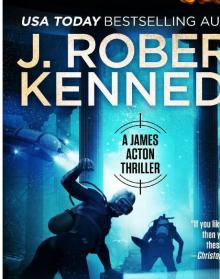 Atlantis Lost
Atlantis Lost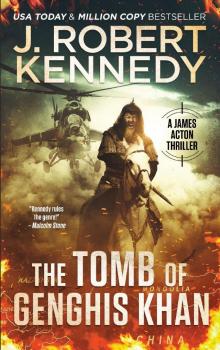 The Tomb of Genghis Khan
The Tomb of Genghis Khan_preview.jpg) Rogue Operator (A Special Agent Dylan Kane Thriller, Book #1)
Rogue Operator (A Special Agent Dylan Kane Thriller, Book #1) Forgotten
Forgotten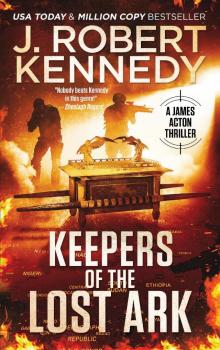 Keepers of the Lost Ark
Keepers of the Lost Ark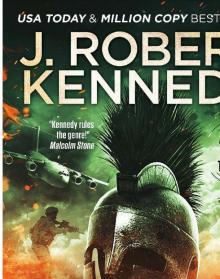 The Cylon Curse
The Cylon Curse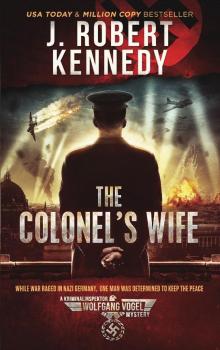 The Colonel's Wife
The Colonel's Wife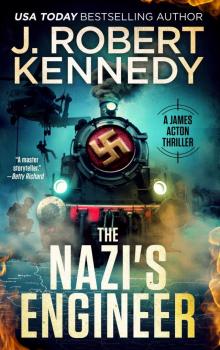 The Nazi's Engineer
The Nazi's Engineer Saint Peter's Soldiers (A James Acton Thriller, Book #14)
Saint Peter's Soldiers (A James Acton Thriller, Book #14)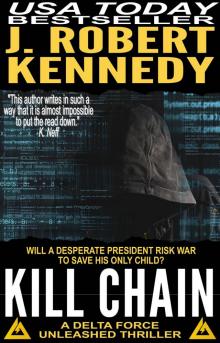 Kill Chain
Kill Chain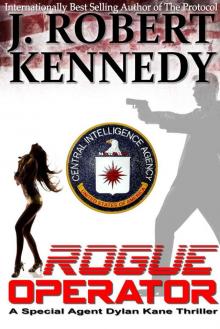 Rogue Operator
Rogue Operator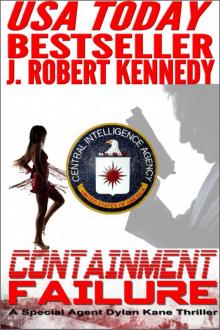 Containment Failure (A Special Agent Dylan Kane Thriller, Book #2)
Containment Failure (A Special Agent Dylan Kane Thriller, Book #2) The Lazarus Moment
The Lazarus Moment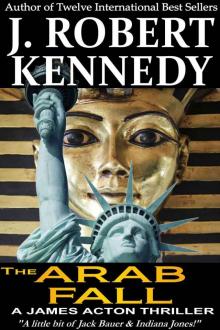 The Arab Fall (A James Acton Thriller, Book #6) (James Acton Thrillers)
The Arab Fall (A James Acton Thriller, Book #6) (James Acton Thrillers) Payback
Payback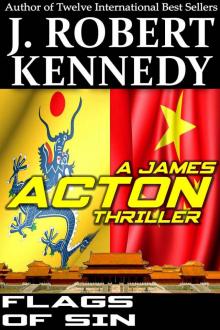 Flags of Sin - 05
Flags of Sin - 05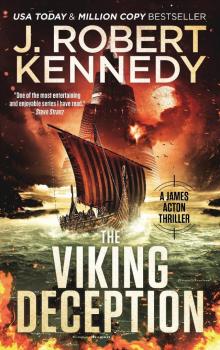 The Viking Deception
The Viking Deception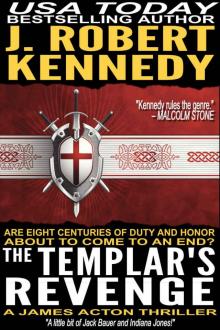 The Templar's Revenge (A James Acton Thriller, #19) (James Acton Thrillers)
The Templar's Revenge (A James Acton Thriller, #19) (James Acton Thrillers)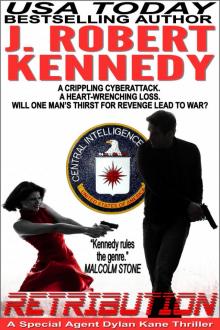 Retribution - A Special Agent Dylan Kane Thriller Book #7
Retribution - A Special Agent Dylan Kane Thriller Book #7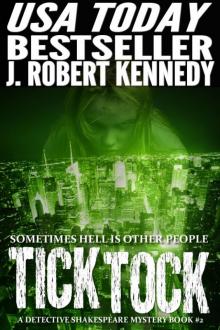 Tick Tock (A Detective Shakespeare Mystery, Book #2)
Tick Tock (A Detective Shakespeare Mystery, Book #2) Blood Relics (A James Acton Thriller, #12)
Blood Relics (A James Acton Thriller, #12)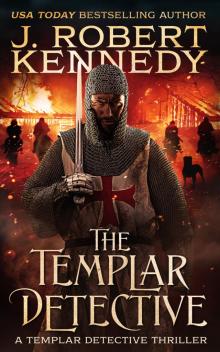 The Templar Detective
The Templar Detective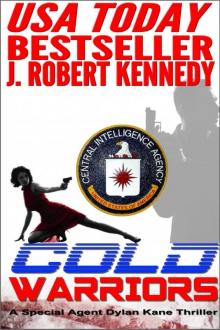 Cold Warriors (A Special Agent Dylan Kane Thriller, Book #3)
Cold Warriors (A Special Agent Dylan Kane Thriller, Book #3)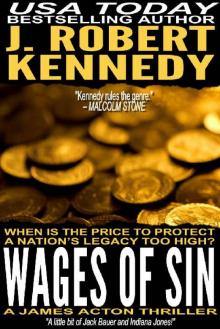 Wages of Sin (A James Acton Thriller, #17) (James Acton Thrillers)
Wages of Sin (A James Acton Thriller, #17) (James Acton Thrillers) The Templar Detective and the Parisian Adulteress
The Templar Detective and the Parisian Adulteress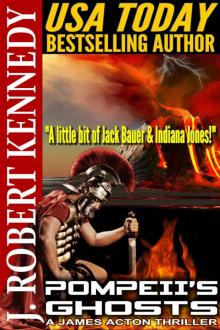 Pompeii's Ghosts (A James Acton Thriller, #9)
Pompeii's Ghosts (A James Acton Thriller, #9) Raging Sun (A James Acton Thriller, #16) (James Acton Thrillers)
Raging Sun (A James Acton Thriller, #16) (James Acton Thrillers)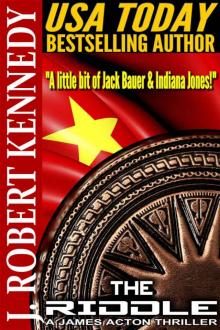 The Riddle (A James Acton Thriller, Book #11)
The Riddle (A James Acton Thriller, Book #11)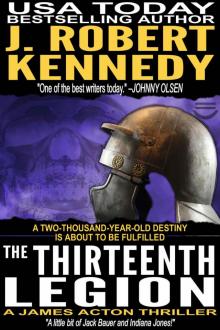 The Thirteenth Legion (A James Acton Thriller, #15) (James Acton Thrillers)
The Thirteenth Legion (A James Acton Thriller, #15) (James Acton Thrillers)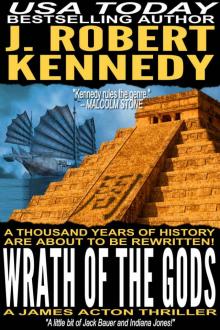 Wrath of the Gods (A James Acton Thriller, #18) (James Acton Thrillers)
Wrath of the Gods (A James Acton Thriller, #18) (James Acton Thrillers)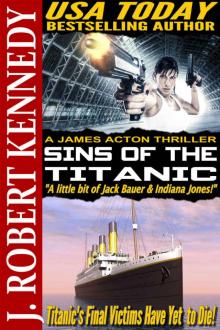 Sins of the Titanic (A James Acton Thriller, #13)
Sins of the Titanic (A James Acton Thriller, #13) Amazon Burning (A James Acton Thriller, #10)
Amazon Burning (A James Acton Thriller, #10)